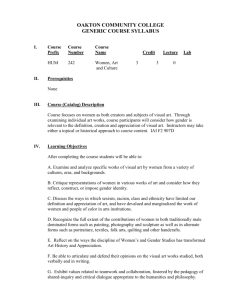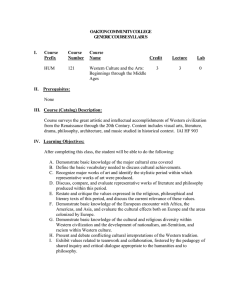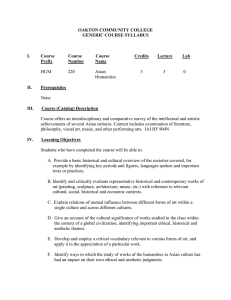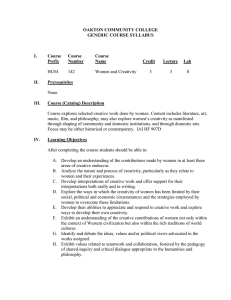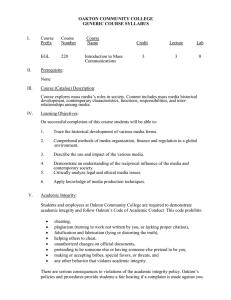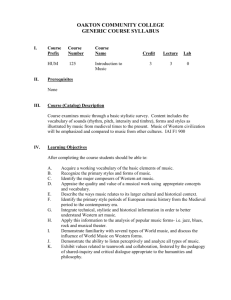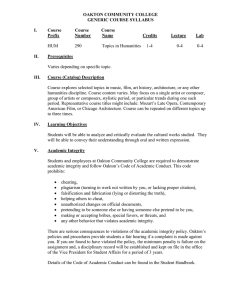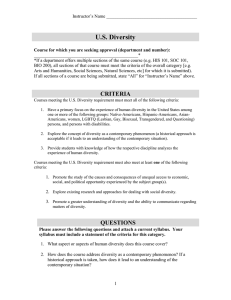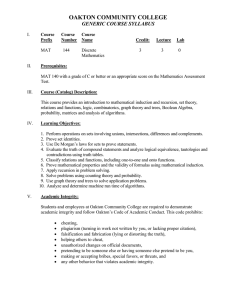OAKTON COMMUNITY COLLEGE GENERIC COURSE SYLLABUS I.
advertisement
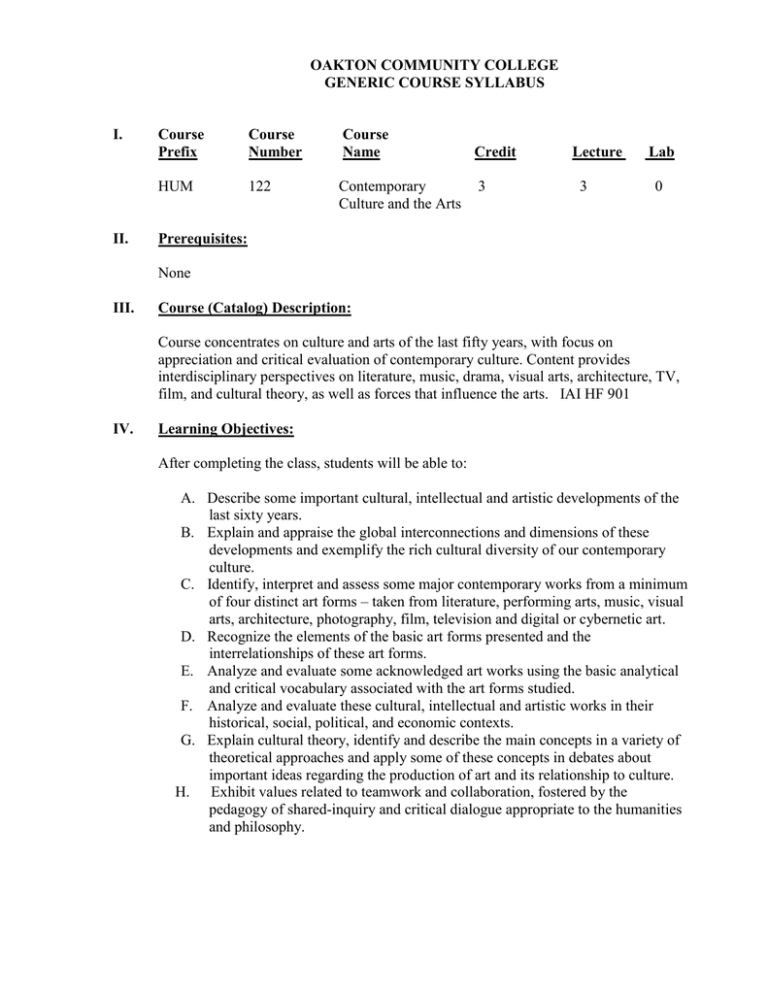
OAKTON COMMUNITY COLLEGE GENERIC COURSE SYLLABUS I. II. Course Prefix Course Number Course Name HUM 122 Contemporary Culture and the Arts Credit 3 Lecture 3 Lab 0 Prerequisites: None III. Course (Catalog) Description: Course concentrates on culture and arts of the last fifty years, with focus on appreciation and critical evaluation of contemporary culture. Content provides interdisciplinary perspectives on literature, music, drama, visual arts, architecture, TV, film, and cultural theory, as well as forces that influence the arts. IAI HF 901 IV. Learning Objectives: After completing the class, students will be able to: A. Describe some important cultural, intellectual and artistic developments of the last sixty years. B. Explain and appraise the global interconnections and dimensions of these developments and exemplify the rich cultural diversity of our contemporary culture. C. Identify, interpret and assess some major contemporary works from a minimum of four distinct art forms – taken from literature, performing arts, music, visual arts, architecture, photography, film, television and digital or cybernetic art. D. Recognize the elements of the basic art forms presented and the interrelationships of these art forms. E. Analyze and evaluate some acknowledged art works using the basic analytical and critical vocabulary associated with the art forms studied. F. Analyze and evaluate these cultural, intellectual and artistic works in their historical, social, political, and economic contexts. G. Explain cultural theory, identify and describe the main concepts in a variety of theoretical approaches and apply some of these concepts in debates about important ideas regarding the production of art and its relationship to culture. H. Exhibit values related to teamwork and collaboration, fostered by the pedagogy of shared-inquiry and critical dialogue appropriate to the humanities and philosophy. COURSE SYLLABUS (GENERIC) Page 2 HUM 122 V. Academic Integrity: Students and employees at Oakton Community College are required to demonstrate academic integrity and follow Oakton’s Code of Academic Conduct. This code prohibits: cheating, plagiarism (turning in work not written by you, or lacking proper citation), falsification and fabrication (lying or distorting the truth), helping others to cheat, unauthorized changes on official documents, pretending to be someone else or having someone else pretend to be you, making or accepting bribes, special favors, or threats, and any other behavior that violates academic integrity. There are serious consequences to violations of the academic integrity policy. Oakton’s policies and procedures provide students a fair hearing if a complaint is made against you. If you are found to have violated the policy, the minimum penalty is failure on the assignment and, a disciplinary record will be established and kept on file in the office of the Vice President for Student Affairs for a period of 3 years. Details of the Code of Academic Conduct can be found in the Student Handbook. VI. Outline of Topics: (The instructor may elect to organize the class according to historical development in the arts, by individual art forms, by geographical region, or by contemporary issues. The instructor’s outline should specify the dates when specific topics will be covered and should list important dates such as exams and paper deadlines.) Sample of an outline organized by art form—a unit on each of the following: Cultural Theory The Visual Arts: Painting, sculpture, photography, graphic and design arts. The Performing Arts: Theater, TV, Film, Performance Art Music: Popular music, hip hop, salsa, world music, jazz, classical music. Literature: Poetry, short stories, novels, graphic novels Sample organized by topic—a unit on each of the following: Representations of Violence in Contemporary Visual, Performing and Literary Arts The Arts, Race, and Gender Art, Politics and Freedom of Expression The Debate over Postmodernism The Impact of Globalization and Post Colonialism on Diverse Contemporary Art Forms The Future of the Arts Sample organized by a geographical region—a unit on each of the following: Architecture in Chicago Public Art in Chicago COURSE SYLLABUS (GENERIC) Page 3 HUM 122 Blues, Rap and Hip-hop in Chicago Contemporary Theater in Chicago VII. Methods of Instruction: Course may be taught as a face-to-face, media-based, hybrid, or online course. The course will involve lectures, as well as seminar style discussions and small group activities. Students will listen to music, view slides, and when appropriate, view sections of videos. Students will be expected to participate actively and to come prepared for discussion. This means students should have read all assigned material prior to class meetings. Students will also be expected to participate in field trips to concerts, plays, art exhibitions, and similar events. VIII. Course Practices Required: (Please include information here about expectations you have for your students regarding behavior, work, etc. The following are sample topics you may wish to cover. Please be aware that Illinois state guidelines require students in this course to produce at least 15 pages of critical written assignments over the course of the semester. These may be assigned in a variety of ways including journals, response papers, field trip projects, etc.) IX. Attendance Standards for written work Quizzes/Exams Participation Essays Final Project Special policies about make-up exams, late papers, or other matters of concern Instructional Materials: Note: Current textbook information for each course and section is available on Oakton’s Schedule of Classes. (The choice of specific instructional materials – books, films, artworks, articles, music, TV, videos, etc is at the discretion of the instructor. This choice should reflect a commitment to the interdisciplinary nature of the class. What follows is a list of sample materials.) General Texts and Anthologies Ashcroft (editor), The Post-Colonial Studies Reader Fiero, The Humanistic Tradition, Volume 6 Jameson and Miyoshi (editors), The Cultures of Globalization Literature Kushner, Angels in America COURSE SYLLABUS (GENERIC) Page 4 HUM 122 McClatchey (editor), Vintage Book of World Poetry Morrison, Beloved Rushdie, Midnight’s Children Satrapi, Persepolis Wilson, Fences Film Avatar Blow-Up Cholay Chung King Express Hiroshima Mon Amour Music Bohlman, World Music: A Very Short Introduction Strode and Wood (editors), HipHop Reader Art Berger, Ways of Seeing Freeland, But is it Art? Sontag, Regarding the Pain of Others Theory Anzaldua, Borderlands Barber, Jihad Verses McWorld Hooks, Outlaw Culture: Resisting Representations Marcuse, One-Dimensional Man Said, Selections from Reflections of Exile X. Methods of Evaluating Student Progress: (In this section, please present the percentages or point breakdown of their final grade. The writing assignments should count for at least 40% of the final grade. An example follows.) Quizzes/Exams……40 points Essays/Reviews……40 points Final project with oral presentation……10 points Attendance and participation………10 points Grading scale: 90-100, A…….80-89, B………70-79, C……….60-69……..D XI. Other Course Information: A. Disabilities If you have a documented learning, psychological, or physical disability you may be entitled to reasonable academic accommodations or services. To request accommodations or services contact the Access and Disability Resource Center at the COURSE SYLLABUS (GENERIC) Page 5 HUM 122 Des Plaines or Skokie campus. All students are expected to fulfill essential course requirements. The College will not waive any essential skill or requirement of a course or degree program. B. Discrimination The Oakton Community College Catalog states: Oakton Community College does not discriminate on the basis of race, color, creed, religion, national origin, disability, age, sex, sexual orientation, or marital status in admission to and participation in its educational programs, activities and services, or employment practices. The College does not tolerate sexual harassment or sexual assault by or of its students or employees. In keeping with this policy of tolerance and non-discrimination, in this class all of us (myself included) should strive to listen and give careful consideration to all ideas expressed in class, especially those that are different from our own, without attacking or demeaning the people who have those views. We should also strive to avoid using insulting terms or telling offensive jokes when talking to or about individuals or groups. C. Instructor information Office and office hours: Phone: Email and website: Approval Dates: (Faculty: Do not include the following information on your individual syllabi created for class distribution.) Effective beginning term: Fall 2013 Ending term: Syllabus prepared by: Hollace Graff Date: March 2006 Revised by: Date: June 2010 Briones, Mehdi, Graff Reviewed by Chair: Hollace Graff Date: July 2010 Approval by Dean: Linda Korbel Date June 2013
